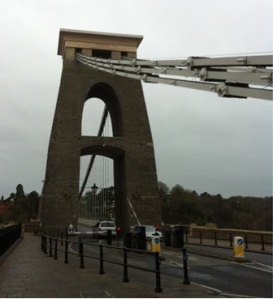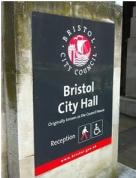Thom Oliver
Its election time in Bristol and there is a strange feeling in the air, something has changed and it’s not the colour of the mayor’s trousers. George Ferguson is now the sole power and the culture of politics is perhaps changing in the City.
In a recent news article BBC Bristol Reporter Robin Markwell stopped short of asking the question ‘whats the point of councillors’ in favour of ‘why bother voting‘? As the ‘no’ campaigners warned in their literature about the dangers of placing all the power of the hands of one person, the election of an Independent mayor in Bristol has got some councillors re-evaluating their role and redoubling their focus. With a third of the council up for election and the Lib Dems with potentially the most to lose the mayoral model is also changing the focus and content of campaigns.
As the second largest group on the council, and not a member of the multi-party cabinet, Labour’s campaigning at first glance seems quite generic. It stresses a national stance against the bedroom tax and champions the NHS, which in the light of national events may strike a chord with many. Their local pledges focus around making Bristol a Living Wage City (something Ferguson has spoken against in the past), a piggy-backing onto the campaign of local non-political activist Daniel Farr against the Fares of FirstBus, along with a desire for more affordable homes and childcare places. The movement to pushing these broader campaigns is unsurprising in the light of the movement to a mayoral model.
Across the city the Liberal Democrats have perhaps grasped the nettle of change more strongly, a campaign leaflet reads:
‘This election won’t decide who runs Bristol, or the country. It’s about the best person to stand up for our local area and fight our corner on the council’.
This focus is not so much a change, but perhaps a re-assertion of the community politics and community champion focus which served the party so well before any conception of the party as one of national government. Yet for a party which until the election of Ferguson was running the council, it’s certainly a re-evaluation.
Elsewhere across the City the Conservatives are hugging the mayor tight in their campaigns and the Green party (contesting all seats) are concentrating their efforts on two wards including the one where they already have one councillor. Independents for Bristol remain a bit of an enigma, and it is difficult to even estimate their electoral chances. Their campaigning led with a leaflet about the Independents for Bristol umbrella group, followed by a ‘Magnificent seven’ leaflet (although they are in fact standing 8 candidates) which again made little of localised campaigns or individuals as candidates, with the final leaflet due to hit letterboxes soon it’s a short time for candidates to assert their independence and individuality, this work is presumably being done on the doorstep.
With party politics a dirty word, Independents for Bristol have focused on the Nolan principles for politicians and appointees as an ideological basis, on the evidence thus far in terms of group organisation, the messaging on campaign literature and the existence of selection panels some are beginning to ask the question: if it walks like a duck, and quacks like a duck… The challenge for IfB is and will remain in giving independent candidates a competitive platform against better resourced local parties without impinging on the independence of individual candidates. This was highlighted by Helen Mott (IfB Candidate) in her recent blogpost.
As the campaign plays out questions on the composition of Ferguson’s all-party cabinet remain of interest to locals and politicos. Recently the mayor moved with great relief to fill the void left by Labour councillors as both the local party and National NEC vetoed any Labour involvement in George’s new politics. He appointed two Lib Dems and a Conservative to join his skeletal and stretched cabinet of one a Conservative, a Liberal Democrat and a Green. As George and the group leaders look over their coffee cups the morning after the count the spectre of this debate will re-emerge asking questions about George’s new politics and how councillors, independents, parties can promote campaigns, champion their local areas and ultimately get the man in the red trousers to listen.
Dr Thom Oliver is a Postdoctoral Research Fellow at Oxford Brookes Business School. He completed his PhD, exploring the representative role of councillors on appointed bodies, at INLOGOV in 2011. He currently lives in Bristol and has recently rejoined INLOGOV as an Associate. Follow his Twitter account here, and read his own blog here.





